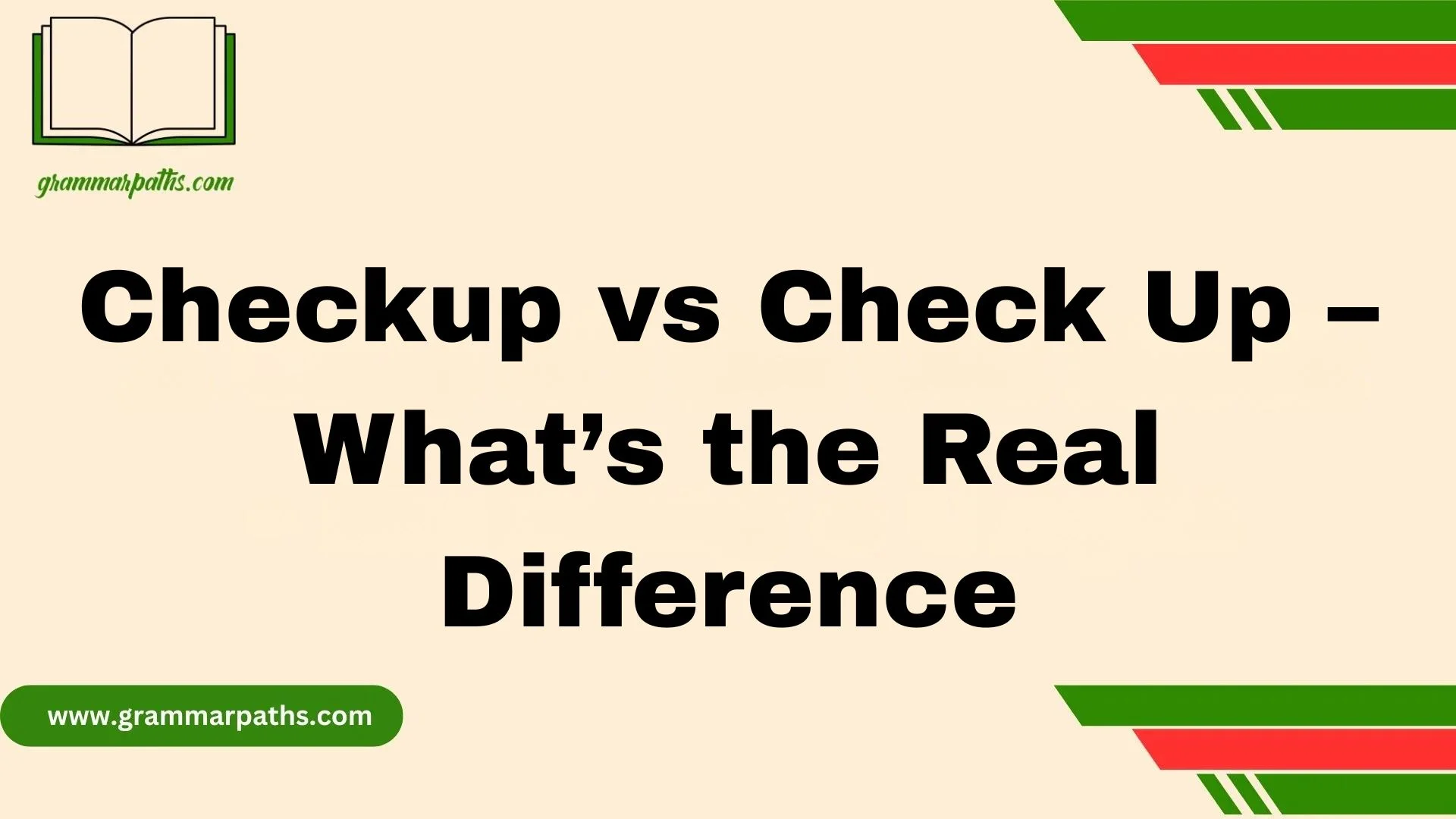When you’re learning English, it’s easy to feel confusion around similar expressions like Checkup and Check Up. Both look alike, but they serve different purposes in grammar and usage. The key to choosing the correctly written word lies in the context and how you plan to use it. In the phrase “Checkup or Check Up – What’s the Difference?”, the difference can boost your writing and help you sound more confident, especially in real-world situations where communication must be clear and effective. Think of Checkup as a noun, mostly related to health or vehicle inspection, while Check Up is a verb phrase, used when you’re going to check up on someone or something. This small yet subtle difference affects the tone of your message, whether it’s formal or casual.
As a language coach, I always tell students to practice with real examples. If you’re unsure which to pick, try to understand the meaning first—ask yourself if you’re naming a thing or describing an action. That will help you use the proper expression every time. Personally, reviewing documents and emails over the years has helped me recognize these tricky patterns. It’s not just about being correct; it’s about improving how we speak, write, and connect with others. The more you understand the right form, the more your clarity and communication will naturally improve.
One Word or Two? Why Does It Matter?
At first glance, checkup and check up look almost identical. But they serve different roles in English. Using the wrong form can make your writing sound awkward or even confuse your reader.
Imagine you’re booking a doctor’s appointment. You write, “I need to schedule a doctor check up.” Feels off, right? The right phrase is doctor checkup because you’re talking about a thing—an appointment. Conversely, if you say, “I need to check up on my doctor’s advice,” you’re describing an action—following up or investigating.
Getting these right matters, especially in formal writing, emails, or professional contexts where clarity is king. Plus, native speakers instinctively know the difference, so mixing them up can make your writing seem less polished.
Checkup vs Check Up: Core Definitions
Before diving into usage, let’s define each term precisely.
| Term | Part of Speech | Meaning | Example |
| checkup | Noun | A routine assessment or evaluation | “I have my annual checkup tomorrow.” |
| check up | Phrasal verb | To investigate, follow up, or verify | “I’ll check up on the project status.” |
Checkup (Noun)
- Refers to a scheduled or routine evaluation, often related to health.
- Commonly used in medical, financial, automotive, and other contexts where an official inspection or review happens.
- Functions as a thing or event.
Check Up (Verb Phrase)
- Describes the act of examining, verifying, or following up on something.
- Typically used with a preposition like “on” (“check up on someone”).
- Represents an action or process.
The Correct Use of “Checkup” in Everyday English
Most often, checkup appears as a noun meaning a planned review or inspection. It signals a thing, not an action.
Here are the common areas where you’ll find checkup used correctly:
- Medical appointments: Annual physicals, pediatric visits, dental exams.
- Financial reviews: Retirement plan evaluations, tax checkups, investment reviews.
- Vehicle inspections: Routine car maintenance and safety checks.
Examples:
- “I have a checkup with my doctor next week.”
- “It’s time for a financial checkup before tax season.”
- “Don’t forget your car’s annual safety checkup.”
Remember, checkup is a noun. It describes the event or thing happening.
When to Use “Check Up” (Phrasal Verb Form)
You use check up as a verb phrase when you want to say you’re doing something—checking or following up on a person, project, or situation.
Usually, it comes with a preposition like “on” to specify what you’re checking.
Examples:
- “Can you check up on the kids while I’m out?”
- “I need to check up on the status of our order.”
- “She called to check up on her grandmother.”
This form highlights the action of verifying or following up.
The Role of Prepositions: “Check Up On” vs “Checkup”
Prepositions can change how phrases function, so it’s important to notice the difference between:
- “Checkup appointment” (noun phrase — a scheduled event)
- “Check up on a patient” (verb phrase — an action performed)
Here’s a simple diagram:
| Phrase | Function | Example |
| Checkup (noun) | A thing, event | “My doctor scheduled a checkup.” |
| Check up (verb + prep) | Action + preposition | “I’ll check up on the patient.” |
Using “check up” without a preposition like “on” can sound incomplete or wrong. Always remember the preposition when it’s a verb phrase.
“Check-Up” with a Hyphen: Is It Ever Correct?
You might see check-up spelled with a hyphen. So, is that right?
In modern American English, “checkup” as one word is the preferred spelling. The hyphenated form is mostly outdated or found in British English or older texts.
- Most dictionaries, including Merriam-Webster and Oxford, list checkup as the standard noun.
- Hyphenation can sometimes appear in older medical documents or formal writing but isn’t necessary now.
- Also, it’s a myth that “check-up” is an adjective. It’s just a noun, and whether hyphenated or not, it acts as a noun.
Sentence-Level Comparison: Real Examples in Action
Let’s compare right and wrong uses to make things clearer:
- Correct: “I need to schedule my annual checkup.”
- Incorrect: “I need to schedule my annual check up.”
- Correct: “She will check up on the children while you’re away.”
- Incorrect: “She will do a check up on the children.”
Here are more examples to lock it in:
| Sentence (Correct) | Explanation |
| “Don’t forget your dental checkup.” | Noun: event/appointment |
| “I’ll check up on the team’s progress.” | Verb phrase + preposition |
| “Financial checkups help avoid surprises.” | Noun, plural |
| “Can you check up on the delivery?” | Action of verifying |
Specialized Contexts Where “Checkup” is Used
Medical and Health
The most familiar use of checkup is in healthcare. Doctors recommend regular checkups to catch problems early and maintain health.
- Annual physicals help monitor blood pressure, cholesterol, and overall well-being.
- Pediatricians perform routine checkups to track growth and development.
- Mental health professionals may suggest psychological checkups.
Financial Planning
Financial advisors encourage financial checkups to:
- Review investment portfolios.
- Adjust retirement plans.
- Prepare for tax deadlines.
Regular financial checkups reduce risks and help meet goals.
Automotive and Mechanical
Vehicles require regular checkups too. These ensure safety and prolong life.
- Engine inspections.
- Oil and fluid checks.
- Tire and brake evaluations.
Skipping vehicle checkups can lead to costly repairs or accidents.
Where “Check Up” Applies Instead
The verb phrase check up focuses on actions like following up or monitoring.
Common scenarios include:
- Following up on a person’s condition: “I’ll check up on your recovery.”
- Tracking progress on projects: “We need to check up on sales numbers.”
- Remote work communication: “Managers often check up on their teams virtually.”
- Child or elder care: “Nurses regularly check up on patients.”
Frequently Misused Phrases & How to Fix Them
Misusing these terms is common but easy to fix once you know the rules. Here’s a quick reference:
| Common Mistake | Correction | Why |
| “Annual check up with the doctor.” | “Annual checkup with the doctor.” | Noun form; use one word |
| “Let’s do a checkup on them.” | “Let’s check up on them.” | Action verb phrase needed |
| “She needs a check up on the kids.” | “She needs to check up on the kids.” | Verb phrase requires ‘to’ + preposition |
| “Schedule a check up appointment.” | “Schedule a checkup appointment.” | Noun, compound word |
Quick Rules of Thumb: How to Always Get It Right
Here’s a simple way to remember:
- If it’s a thing or event → use “checkup.”
- If it’s an action or verb phrase → use “check up.”
Think of it this way: nouns name things; verbs describe actions. Stick to this and you’ll be right 95% of the time.
Expert Opinions and Dictionary Entries
Authoritative sources back this up:
- Merriam-Webster: Lists checkup as a noun meaning “a medical or dental examination.”
- Oxford Learner’s Dictionary: Defines check up as a verb phrase meaning “to find out how someone is.”
- Cambridge Dictionary: Recognizes checkup as a noun and check up as a phrasal verb with “on.”
Here are the links for further reading:
- Merriam-Webster
- Oxford Learners Dictionary
- Cambridge Dictionary
Conclusion: Stop Second-Guessing “Checkup” vs “Check Up”
Even small choices in words like Checkup or Check Up can make a big impact on how well you’re understood. Once you learn their meanings and usage, you’ll find it easier to pick the right word, whether in writing or speech. Mastering these subtle differences will not only help you become a better communicator but also give you more confidence in both formal and casual conversations.
FAQs:
Q1: Is “Checkup” one word or two?
A: Checkup is one word when used as a noun, such as “I have a doctor’s checkup.”
Q2: When should I use “Check Up” as two words?
A: Use Check Up as a verb phrase—for example, “I need to check up on my friend.”
Q3: Is it wrong to use “checkup” in casual writing?
A: Not at all. Checkup fits both formal and casual writing when used correctly.
Q4: Can “Checkup” be used for vehicles?
A: Yes, you can say, “My car is due for a checkup,” meaning a vehicle inspection.
Q5: Why is this difference important in writing?
A: It ensures your message is clear and grammatically correct, which improves overall communication.
Bonus: Mini Quiz – Can You Spot the Errors?
Try these sentences. Which are correct?
- “I’m going for a quick check up at the clinic.”
- “She wants to check up on her friend.”
- “We scheduled our dog’s annual checkup.”
- “Can you do a checkup on the email issue?”
Answers:
- ❌ Wrong → should be “checkup” (noun)
- ✅ Correct
- ✅ Correct
- ❌ Wrong → should be “check up on”

Grace Marie is the dedicated writer behind GrammarPaths.com, where she shares her passion for English grammar, idioms, and writing mastery. With a strong background in language studies and years of experience helping learners improve their communication skills, Grace creates clear, practical, and engaging content that makes English easy to understand.












